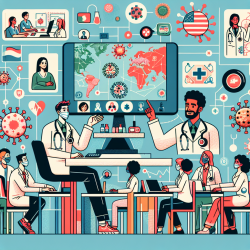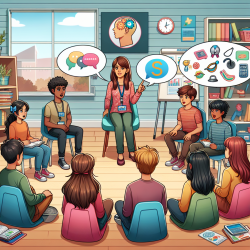Introduction
The COVID-19 pandemic has been a catalyst for change across various sectors, including education. One such innovative response was the Pandemic Medicine Elective at the Medical College of Georgia (MCG). This program offers valuable insights for practitioners looking to enhance their skills and adapt to the evolving educational landscape. Let's explore how the outcomes of this elective can help you improve your practice and why further research is essential.
Understanding the Pandemic Medicine Elective
The Pandemic Medicine Elective was developed in response to the challenges posed by COVID-19, offering a virtual alternative to traditional clinical experiences. This elective was unique in its interdisciplinary approach, involving faculty from various departments to deliver a comprehensive curriculum. The program included lectures on the science of COVID-19, global and US health systems, and the impact of the pandemic on healthcare professionals.
Students were also involved in service initiatives, allowing them to apply their learning in real-world settings. These initiatives included medical education updates, information services, PPE distribution, telemedicine promotion, and mental health support.
Key Takeaways for Practitioners
Here are some practical insights from the Pandemic Medicine Elective that can help you improve your skills:
- Embrace Interdisciplinary Learning: The elective highlighted the importance of integrating knowledge from various fields to address complex challenges. Consider collaborating with professionals from different disciplines to enhance your practice.
- Utilize Technology: The elective's success was partly due to its use of online platforms like Microsoft Teams. Explore digital tools that can facilitate remote learning and patient care in your practice.
- Focus on Service Learning: Engaging in community service projects can provide valuable hands-on experience. Look for opportunities to involve your students or team in initiatives that address current public health challenges.
- Adaptability is Key: The elective's rapid development and implementation demonstrate the importance of being flexible and open to change. Stay informed about new developments in your field and be ready to adapt your approach as needed.
Encouraging Further Research
While the Pandemic Medicine Elective offers valuable lessons, further research is essential to continue improving educational practices. Consider exploring the following areas:
- Telemedicine: Investigate the long-term impact of telemedicine on patient care and education. How can we optimize its use in different settings?
- Interdisciplinary Approaches: Study the benefits and challenges of interdisciplinary collaboration in education and healthcare. What strategies can enhance these partnerships?
- Service Learning: Examine the impact of service learning on student outcomes and community health. How can we better integrate these experiences into curricula?
Conclusion
The Pandemic Medicine Elective at MCG serves as an inspiring example of how educational institutions can adapt to unprecedented challenges. By embracing interdisciplinary learning, utilizing technology, focusing on service learning, and remaining adaptable, practitioners can enhance their skills and better serve their communities. To continue this journey of improvement, further research in telemedicine, interdisciplinary approaches, and service learning is crucial.
To read the original research paper, please follow this link: Adapting Education at the Medical College of Georgia at Augusta University in Response to the COVID-19 Pandemic: the Pandemic Medicine Elective.










